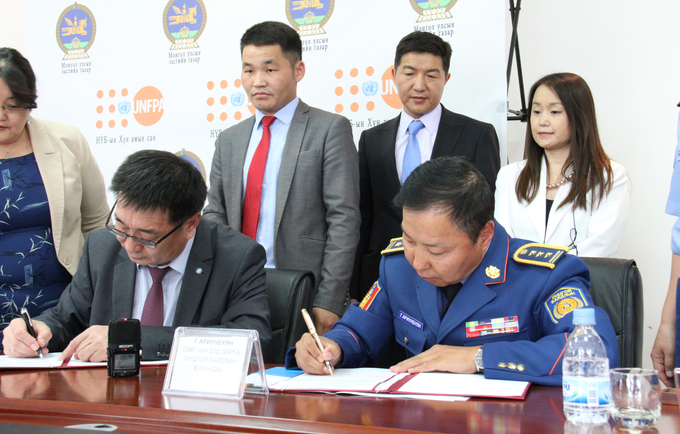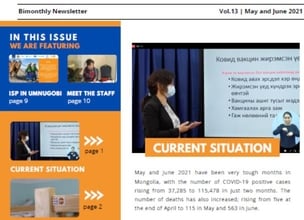ULAANBAATAR, Mongolia – On 11 July, as communities everywhere will be observing World Population Day, UNFPA will focus its attention on the urgency and importance of population issues, particularly “Vulnerable Populations in Emergencies”.
A recent United Nations report warns that the number of forcibly displaced people has risen to a record number –almost 60 million at the end of 2014. Among these, most women and adolescent girls face particular threats as a result of the absence of health and other essential services that they need.
Recognizing the urgent need for preparedness in disaster risk reduction, specifically for the most vulnerable, his Excellency Deputy Prime Minister of Mongolia Ukhnaagiin Khurelsukh, Chairman of the National Statistical Office of Mongolia Sonomtseren Mensaikhan, Deputy Chief of the National Emergency Management Agency of Mongolia Colonel Gombojav Ariunbuyan and UNFPA Representative Naomi Kitahara held a joint press conference at the Government House on July 7th.
By the initiative of Deputy Prime Minister Ukhnaagiin Khurelsukh, the National Statistical Office /NSO/ and the National Emergency Management Agency /NEMA/ signed a Memorandum of Understanding that enables cooperation of NSO and NEMA on development and exchange of statistical data on emergencies.This partnership will ensure that the most vulnerable populations, especially women and girls, are quickly identified and protected in the unfortunate aftermath of an emergency.
Girls and women in crisis situations face much greater risk of abuse, sexual exploitation, violence, reproductive health-related illnesses, and death due to a lack of protection and an absence of aid that addresses their needs. With or without disaster, human life will continue. Pregnancies do not stop because of a disaster and we must reflect the special needs of women, particularly pregnant women, in disaster settings.
On this World Population Day, UNFPA is pleased to see the Government of Mongolia taking proactive steps to support the most vulnerable populations in emergencies.
“When a crisis strikes, humanitarian response must be swift and adaptable to the needs of affected populations. Women and young people may especially require targeted support, and aid must be sustained from the onset of an emergency until recovery,” stated UNFPA Executive Director, Dr Babatunde Osotimehin.
About UNFPA (www.mongolia.unfpa.org)
UNFPA is the UN agency delivering a world where every pregnancy is wanted, every childbirth is safe and every young person's potential is fulfilled. UNFPA Mongolia currently implements the 5th Country Programme 2012-2016, closely in line with the United Nations Development Assistance Framework for Mongolia.



